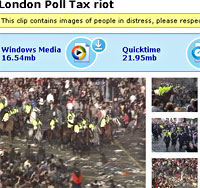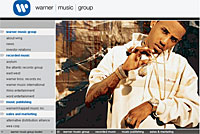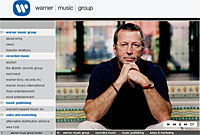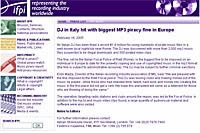 A “well known” Italian DJ could be hit with a record-breaking fine of up to 1.4 million euros ($1.8 million, £968,000) for using thousands of pirate music files in a nightclub near Rome, police said on Wednesday.
A “well known” Italian DJ could be hit with a record-breaking fine of up to 1.4 million euros ($1.8 million, £968,000) for using thousands of pirate music files in a nightclub near Rome, police said on Wednesday.
Police in the town of Rieti, near Rome, said they raided a popular nightclub earlier this week as part of a king-size crackdown on piracy and seized 500 illegally copied music videos and more than 2,000 MP3 music files.
The get-tough operation, targeting radio stations and clubs around the region, was led by the Fiscal Police (Guardia Di Financa, that deal with financial crime), who also seized a large quantity of “audiovisual material” and software.
There are a lot of inaccurate reports floating around about this and we wanted to get the full story, so called up the FIMI in Italy. They told us that the copyright law in Italy dates back to 1941 but was most recently updated a year ago. Under the law the DJ was fined 100 Euro ($130, £69) per copied track, this figure was then doubled to 500,000 Euro. Only if the fine is not paid within 60 days, will it increase to 1.4m.
The reason for the doubling was unclear. Under Italian law, the precise details of the case are not made public until the case comes to court.
The DJ is free to appeal against the fine. Once the fine has been finalised, the money can be paid off monthly.
“For the MP3 files, which were kept on the DJ’s personal computer, the DJ has received a fine of 1.4 million euros,” Rieti finance police said in a statement (the fine is subject to administrative recourse). The DJ may also be subject to further criminal sanctions.
The International Federation of the Phonographic Industry (IFPI) said the fine was the biggest ever slapped on an individual for unlawful music copying and the use of copyrighted music in the MP3 format.
“We are pleased with the fine imposed by the Rieti Fiscal police,” said Director of the Italian Recording Industry Association (FIMI) Enzo Mazza.
He continued, “This deejay was touring clubs and making money out of the music he played – while those who had invested time, talent, hard work and money into creating the music in the first place did not get a cent. We hope this precedent will serve as a deterrent for those who are thinking of doing the same.”
Seeing as venues already pay money to the collection societies for public dance licenses we find the size of this fine a little baffling.
It could certainly be argued that DJs can act as ambassadors for new music (and therefore the music companies) with some high-profile DJs having a considerable influence on the record buying public.
After all, why else would record companies ply DJs with endless vinyl/promos and other inducements in the hope of getting their tunes played?
Perhaps now that times are more lean for the record companies, they’re cutting back on the freebies.
It appears the line between theft and promotion can sometimes be a blurred one, and we’re not convinced that punishing DJs with such enormous fines is the way the record industry should be protecting their sales…
 The BBC has announced its Open News Archive, making archive news reports freely available to the UK public to download and use for free in their own creative works.
The BBC has announced its Open News Archive, making archive news reports freely available to the UK public to download and use for free in their own creative works. Made available under the terms of the recently-launched Creative Archive Licence, the footage can be viewed, downloaded, edited and mixed by UK residents – so long as it’s for non-commercial programming (there’s also several other caveats that budding film makers should read first here.)
Made available under the terms of the recently-launched Creative Archive Licence, the footage can be viewed, downloaded, edited and mixed by UK residents – so long as it’s for non-commercial programming (there’s also several other caveats that budding film makers should read first here.) Helen Boaden, Director, BBC News, said: “This trial is an important step in allowing us to share with our audiences the extraordinary news archive which the BBC has recorded over the years. We look forward to getting their reaction.”
Helen Boaden, Director, BBC News, said: “This trial is an important step in allowing us to share with our audiences the extraordinary news archive which the BBC has recorded over the years. We look forward to getting their reaction.” The BBC already offer nearly a hundred clips in their Radio 1 Superstar VJ archive, and are expected to be releasing further content over its websites in the coming months.
The BBC already offer nearly a hundred clips in their Radio 1 Superstar VJ archive, and are expected to be releasing further content over its websites in the coming months. Warner Music Group has announced a new digital music distribution mechanism based on downloads rather than physical media like CDs.
Warner Music Group has announced a new digital music distribution mechanism based on downloads rather than physical media like CDs. With far lower production costs, Bronfman claimed that the e-label will give recording artists a “supportive, lower-risk environment” (I think this means “less cash from the record company”) without as much pressure for huge commercial hits – something that could benefit artists with a more “selective audience”.
With far lower production costs, Bronfman claimed that the e-label will give recording artists a “supportive, lower-risk environment” (I think this means “less cash from the record company”) without as much pressure for huge commercial hits – something that could benefit artists with a more “selective audience”. Bronfman called on the technology industry to work on digital rights management (DRM) standards, arguing that compulsory licensing – with support from P-to-P vendors – would set a price for downloaded music while forcing music companies to make their products available online to P-to-P users.
Bronfman called on the technology industry to work on digital rights management (DRM) standards, arguing that compulsory licensing – with support from P-to-P vendors – would set a price for downloaded music while forcing music companies to make their products available online to P-to-P users. Thrill-seeking mobile phone users around the world slapped out US$400 million on pornographic pictures and video in 2004 – an amount that is expected to rise to US$5 billion by 2010, according to a report by research group Strategy Analytics.
Thrill-seeking mobile phone users around the world slapped out US$400 million on pornographic pictures and video in 2004 – an amount that is expected to rise to US$5 billion by 2010, according to a report by research group Strategy Analytics. The US$5 billion forecast for 2010 represents a huge upward shift from Strategy Analytics’ earlier predictions, with the company noting that adult entertainment businesses are aggressively building services and customers appear happy to shell out for them.
The US$5 billion forecast for 2010 represents a huge upward shift from Strategy Analytics’ earlier predictions, with the company noting that adult entertainment businesses are aggressively building services and customers appear happy to shell out for them. Russian prosecutors are considering filing criminal charges against a Web site that offers cheap music downloads, the music industry’s global trade group has said.
Russian prosecutors are considering filing criminal charges against a Web site that offers cheap music downloads, the music industry’s global trade group has said. A “well known” Italian DJ could be hit with a record-breaking fine of up to 1.4 million euros ($1.8 million, £968,000) for using thousands of pirate music files in a nightclub near Rome, police said on Wednesday.
A “well known” Italian DJ could be hit with a record-breaking fine of up to 1.4 million euros ($1.8 million, £968,000) for using thousands of pirate music files in a nightclub near Rome, police said on Wednesday.